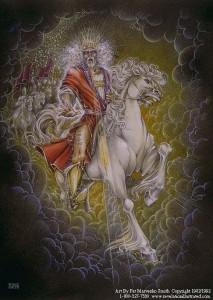 By Dr. Sinclair Ferguson
By Dr. Sinclair Ferguson
Sinclair Ferguson is a noted author, the Senior Minister of the First Presbyterian Church in Columbia, South Carolina, and a Professor of Systematic Theology at Redeemer Seminary in Dallas
My last contact with the late Professor John Murray — to whose writings and influence I, like many others, owe a lasting debt — was particularly memorable for me, partly because I asked him a question to which he gave the answer: “That is a difficult question!” As a somewhat diffident young person it was something of a relief to know that my question wasn’t totally stupid. It is a question on which I have continued to reflect.
So, what was the question? It may seem a rather recondite one. My question was about the translation and the theological significance of the word used both by Peter (Acts 5:31) and the author of Hebrews to describe our Lord Jesus: archegos. Jesus is the author of our salvation who was made perfect through suffering and as such brings many sons to glory (Heb. 2:10). Now the same term reappears towards the end of the letter, in Hebrews 12:2, where our Lord is now described as “the author of our faith who brings it to perfection.”
This explains why, while we are encouraged to read about earlier heroes of the faith (Heb. 11), it is only on Jesus Himself that we are to fix our gaze. If our eyes should stop on anyone who came before Him we will have missed the whole point of the chapter. The Old Testament heroes of faith never received what was promised; they lived before the time of fulfillment. They exercised faith, but they were all trusting in the promise that would be fulfilled in Christ. By contrast, Jesus is the “author” of faith and He is also the one who experienced and expressed it to the full. It is wonderful to think about Jesus in this way. But how do we do so? What did this mean for Him?
Archegos describes an inaugurator, a trail-blazer, a pioneer — someone whose achievements make it possible for others to experience the benefits of what he has done. The school our two eldest sons attended held an annual “Founders’ Day” service at which the two brothers who had first begun the school centuries before were remembered and honored. They had begun something the benefits of which our children entered into and shared. They were archegoi.
But we might describe other religious leaders in these terms, as founders of great movements. Hebrews means more than that when it says Jesus is our archegos.
Think, if you will, of a lone reconnaissance officer who has moved ahead of his platoon, which is in great danger. He is looking for a way of escape. He cuts his way through a jungle, only to discover himself face to face with a gaping ravine. There seems no way forward, but unless he finds one all is lost. He throws a lasso-like rope to the other side of the ravine, and manages to catch it on a tree on the far side. He then risks all by clambering across to the other side, hand over hand, inch by nerve-racking inch. He secures the rope, and manages to create a rope bridge. Eventually he leads his whole platoon over the ravine on to the safety of the other side.
This is a better picture of Christ as our archegos! He is the divine Reconnaissance Officer who has crossed the deep and dangerous ravine between fallen man and holy God.
Continue reading →
 “Jesus Christ is not a tyrant claiming divine right, He is now head over all things in His church, and He reigns over heaven and earth and hell with the keys of life and death at His belt. Certain princes have been glad to call themselves kings by the popular will, and certainly our Lord Jesus Christ is such in His church. If it could be put to the vote whether He should be King in the church, every believing heart would crown Him. We ought to crown Him more gloriously than we do! We would regard no expense too great if we could glorify Christ. Suffering would be pleasure, and loss would be gain, if through that we could surround His brow with brighter crowns and make Him more glorious in the eyes of men and angels. Yes, He shall reign. Long live the King! All hail to You, King Jesus! You souls who love your Lord. Bow at His feet; cover His path with the lilies of your love and the roses of your gratitude: “Bring forth the royal diadem, and crown Him Lord of all.”
“Jesus Christ is not a tyrant claiming divine right, He is now head over all things in His church, and He reigns over heaven and earth and hell with the keys of life and death at His belt. Certain princes have been glad to call themselves kings by the popular will, and certainly our Lord Jesus Christ is such in His church. If it could be put to the vote whether He should be King in the church, every believing heart would crown Him. We ought to crown Him more gloriously than we do! We would regard no expense too great if we could glorify Christ. Suffering would be pleasure, and loss would be gain, if through that we could surround His brow with brighter crowns and make Him more glorious in the eyes of men and angels. Yes, He shall reign. Long live the King! All hail to You, King Jesus! You souls who love your Lord. Bow at His feet; cover His path with the lilies of your love and the roses of your gratitude: “Bring forth the royal diadem, and crown Him Lord of all.”
 By Dr. Sinclair Ferguson
By Dr. Sinclair Ferguson